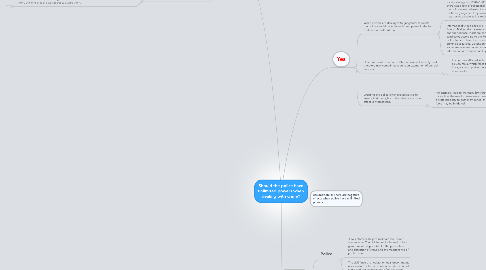
1. NO
1.1. Corruption and the abuse of power where the police may use the power they have for their own welfare purposes.
1.1.1. One case in point is where a number of Colombian police officers were arrested for accepting bribes and returning seized drug to a trafficking group. Furthermore, in Tel Aviv, the second largest city in Israel, details emerged in April this year of an elaborate criminal scheme to turn police officers into informants on behalf of lawbreakers. The officers were accused of accepting cash bribes to tip off a "serious criminal" who runs brothels, and passing on intelligence in ways which are reminiscent of double agents depicted in the Hollywood film The Departed.
1.1.1.1. In a situation where the police were given the right to apprehend law-breakers in order to prevent crime, they abused this right for their own personal gain.
1.1.1.1.1. Therefore there should be limits to the power wielded by the police, with rules and laws to prevent abuse for personal gains.
1.2. Violation of human rights and properties.
1.2.1. -China: Where the christians were tortured by the police. In China, it is technically illegal for citizens to publicly worship or declare their religion unless authorised by the government. There have been cases reported of Christina leaders and followers being interrogated and tortured.
1.2.1.1. -Also in China was the Tiananmen incident of 1989, whereby the police and other organisations of authority were called upon to resist student protesters calling for democracy, and this lead to the government allowing the usage of guns and other armed forces
1.3. Police might become as irrational and brutal as convicts in order to stop a crime as there are no longer any boundaries to stop them.
1.3.1. In the UK TV program “Worst Police Shootouts”, viewers were shocked rigid by the gratuitous legalised murder fest that ensued. Five or six cases were shown, each of which ended in the ‘perpetrator’ being shot, usually to death. In one video, a middle aged lady ran out of her house on a suburban street, obviously in some kind of distress, waving a short kitchen knife. The two attending cops panicked and shot her when she ran towards one of them, thinking that she was about to attack them.
1.3.1.1. if the police use their given authority to behave as they wish while patrolling or chasing criminals, then many more innocent people will be injured or killed in their reckless line of duty. Therefore, since many police force members have already harmed so many people with the current level of authority that they have, it is definitely imprudent assign even greater powers for the police to wield.
2. DEFINITIONS:
2.1. Police
2.1.1. -Law enforcers, help to maintain law, order and security. The civil force of a federal or local government, responsible for the prevention and detection of crime and the maintenance of public order.
2.1.2. The civil force of a federal or local government, responsible for the prevention and detection of crime and the maintenance of public order.
2.2. Unlimited powers
2.2.1. Complete authority
2.3. Crime
2.3.1. Breach of rules or laws
2.3.2. An action or omission that constitutes an offense that may be prosecuted by the state and is punishable by law.
3. Yes
3.1. When it comes to dealing with gangsters/ terrorists, the police should have the unlimited power in the form of detention without trial.
3.1.1. locally: during the 1970s/1980s, there was a lot of triads but there was a lack of substantial evidence of their crimes. If the police wasn't allowed to carry out detention without trial for these gangsters, they would be let free and Singapore may not be as safe as it is today.
3.1.2. Internationally: In places like Russia, Japan, Italy, Mexico and China, where the Russian Mafiya, the Japanese Yakuza, the Italian Mafia, Mexican Drug Cartels and the Chinese Triads are considered the five most powerful criminal syndicates according to the Foreign Policy online 2008, it is essential for the police force to have the necessary authority to apprehend them and bring these criminals to justice. Detention without trial is especially crucial in such areas as sometimes detention and interrogation is the only way of getting substantial information or evidence of illegal traids' crimes.
3.2. Different countries require different levels of security, and therefore may sometimes require an exemption of our civil liberties.
3.2.1. In countries afflicted with high levels of crime such as Columbia, which faces the problem of drug lords, a strong police force is necessary to bring about order.
3.2.1.1. This sometimes entails giving police unlimited power and judgement in carrying out their duties
3.3. Granting the police extended powers is to ensure that the rights of the citizens are more effectively protected.
3.3.1. For example: due to the many laws that the police are restricted by, such as the need to issue search warrants before entering private property to gather evidence, their efficiency as a police force may be hindered.
3.3.1.1. If the police had unlimited power and were able to carry out their duties in an unrestricted manner, the process of resolving a crime may be shortened greatly. This gives criminals less time to cover up their crimes and also helps to ensure the safety of the general public in a faster, more efficient manner as criminals will be dealt with more swiftly.
